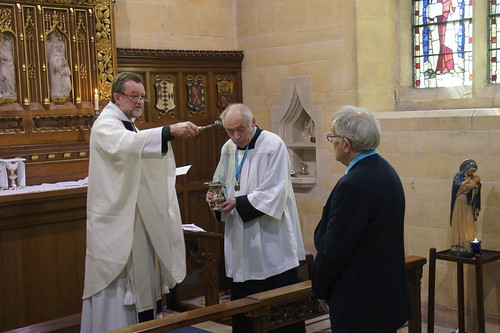Picture: cc Alwyn Ladell
My dear friends, do you remember the late, and much beloved, Fr Antoni Ponnudurai? Well, today happens to be the 3rd anniversary of his passing, and I’m reminded of a story he used to tell, from his time as a newly-arrived missionary in Indonesia. He was beginning Mass one day, with the intention of sprinkling the people with holy water. However, seeing that many of them were gathered at the back of the church, he asked them, in his beginners’ Bahasa Indonesia, to please move to the front, so that he could “throw water” on them. At which all the people burst out laughing. It was only later that he discovered the reason for their amusement. Apparently, the Indonesian words he had used to say “throw water” are actually an euphemism for “urinate”.
In addition to being quite funny, this story also illustrates the difficulties of communicating in a foreign tongue, a different language. Which is also something like what we find in our readings today. In the gospel, Jesus tells his disciples that he will soon be delivered into the hands of men, who will put him to death and, three days later, he will rise again. However, even though the Lord speaks quite plainly, and this is already the second time that he is sharing this distressing news with his disciples, the reading tells us that they did not understand what he said. Why? Why do you think it is so difficult for the disciples to understand the Lord’s words?
I’m not sure. But could it be because Jesus and his disciples are, in a sense, speaking different languages? For the Lord’s decision to freely surrender himself to suffering and death on the cross can only really be understood in the language of loving and merciful self-sacrifice. But the disciples are used to communicating in another, quite different, tongue. Theirs is the language of anxious ambition, and of cut-throat competition. Of constantly having to fight with others, so as to secure one’s place in society. Isn’t this why, soon after learning that their Lord and Master will suffer a painful and shameful death, we find them arguing which of them was the greatest?
And isn’t this also why, the reading begins by telling us that Jesus did not want anyone to know where he and his disciples were, because he was instructing them. The Lord is not just sharing with them a piece of information that is difficult for them to accept. He is actually teaching the disciples to think and speak and act in a whole new way. To use a totally different language from the one with which they are familiar. The one used by the world.
Two different languages, reflecting opposing ways of thinking and speaking and acting. This is also what we find in the first reading. Which speaks to us about the way of the wicked versus the way of the virtuous. On the one hand, the wicked feel so threatened by the virtuous person that they decide to persecute him, to test him with cruelty and with torture, and even to condemn him to a shameful death. In contrast to this violence of the wicked, the virtuous person professes to act always with gentleness and endurance. Trusting that God will take his part and rescue him from the clutches of his enemies.
Deep insecurity leading to violence and conflict, versus trusting confidence producing patient endurance. This is also what we find in the second reading, which presents us with a contrast between the wisdom that comes down from above, as opposed to earthly wisdom from below. Whereas the wisdom from above is kindly and considerate, full of compassion and goodness, leading to peace and holiness. Earthly wisdom is jealous and ambitious, producing disharmony and wickedness, conflict and division.
The reading also goes on to trace this sharp difference in external expression to its inner source deep within the human heart. Speaking to those who use the language of earthly wisdom, the reading asks, Where do these wars and battles between yourselves first start? Isn’t it precisely in the desires fighting inside your own selves? You want something and you haven’t got it; so you are prepared to kill. You have an ambition that you cannot satisfy; so you fight to get your way by force. In contrast to this violence and conflict born of anxiety, the reading tells us that peace and holiness come from hearts that trust in the Lord. Hearts secure in the hope that God will grant whatever we need, if only we pray properly. For, in the words of the psalm, the Lord upholds my life.
Profound anxiety and insecurity, leading to violent competition and conflict, versus deep confidence and trust, expressed in gentleness and compassion, and patient endurance even in the face of persecution. This is the stark contrast that our Mass readings propose to us for our prayerful reflection today. Two completely different languages. Two opposing ways of thinking and speaking and acting. And perhaps this contrast serves as a timely reminder for us, especially in light of the conversations that many people in Singapore have been engaged in recently. Conversations relating to a particular piece of criminal legislation, which some are fighting vigorously to repeal, and others just as vigorously to retain.
I do not propose to consider which, if any, of these positions is the more Christian one. I believe the relevant authority has already provided helpful guidance on this question. But in addition to considering what may be the correct position for Christians to hold, isn’t it just as important, if not even more so, that we also carefully examine the language we use to engage others in conversation? When we speak about an issue as contentious as this, do we use the new heavenly language of gentleness and compassion, rooted in a deep trust in the loving mercy of God for all people? Or do we speak only in the earthly tongue of ambition and competition, born of a profound insecurity? The first way leads to peace and holiness. The other to violence and conflict.
Sisters and brothers, as Christians, we believe that we have been blessed by God in order that we, in our turn, may become a blessing to others. A blessing to society. But in order for us to fulfil this role, we need to take care that we always think and speak and act in the language of Christ. The language of loving self-sacrifice.
My dear friends, the late Fr Ponnudurai’s story teaches us that all it takes is an unfortunate choice of words, an inappropriate use of language, to turn a sprinkling of holy water into a shower of smelly urine. A blessing into a curse. How can we avoid doing the same to others today?



